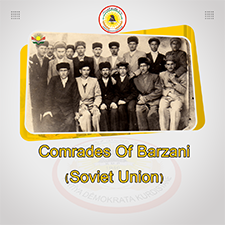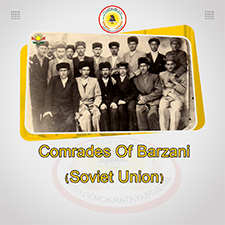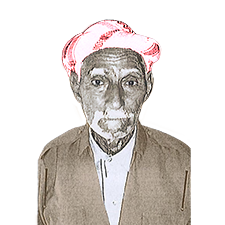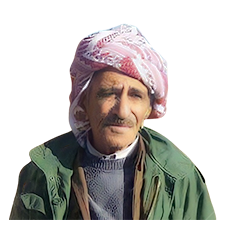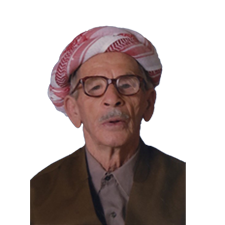Biography
Jader Jangir Jader was born in 1924 in Meroz village of Sherwan Mazen district of Mergasur district of Erbil province. He married in the Soviet Union. He was fluent in Kurdish, Arabic, Turkish and Russian. Due to traffic accidents He died and was buried in the Soviet Union.
Service Record
In 1943, he joined the ranks of the Second Barzan Revolution. He participated in the battles of Nehele, librating Nehele artillery and police station in Barzan region. On August 19, 1945, the Iraqi Military Customary Court ordered the confiscation of all his property.
On October 11, 1945, after the collapse of the Second Barzan Revolution, Jader Jangir Jader crossed with Mustafa Barzani and his comrades to East Kurdistan. After the establishment of the Kurdistan Democratic Republic in Mahabad, on March 31, 1946, he defended the republic within the Barzan forces. After the Kurdistan Republic in Mahabad fell apart, Barzani returned from the east of Kurdistan to the south of Kurdistan. During that time, he participated in Naghada and Shno conflicts. In April19, 1947 he was one of the Peshmarga who returned to Sherwan and the Mizuri region through Khuakwrk and Barazgr area in the north of Kurdistan.
After their return on May 15, 1947, General Mustafa Barzani convenes a conference with his comrades in the village of Argush, and he gives them the option of remaining in Kurdistan or going to the Soviet Union. As a result, on April 23, 1947, he left for the Soviet Union alongside Mustafa Barzani. After that, he was engaged in the Gali Qtur and Prdi Mako fights. After a long and much difficulty, on June 18, 1947, on the Iranian-Soviet border, Mulla Mustafa Barzani and his force crossed the Aras River.
Following their arrival in to Nakhchivan, Azerbaijan on June 19th, 1947, Mustafa Barzani and all of his companions were imprisoned for forty days. In fact, they were given the same treatment as prisoners of war in terms of food, clothing, and transportation while living in a camp which was surrounded by barbed wire and guarded by soldiers. Not long after, by decision of Soviet Union government, they were divided into groups and transferred to the regions of Aghdam, Lachin, Ayulakh and Kalbajar in the Republic of Azerbaijan. By December 10, 1947, they were moved to a military base on the Caspian Sea in Baku, the capital of the Republic of Azerbaijan. On the 23rd of the same month on the Caspian Sea in Baku, the capital of the Republic of Azerbaijan, Barzani's followers were organized into a military regiment and received training in military tactics and politics and taught to read and write Kurdish by their other educated Peshmarga. As a result of Jafar Bakirov's mistreatment, On August 29, 1948, Mulla Mustafa Barzani made the decision to relocate his military camp from Azerbaijan to the village of Chirchuk close to Tashkent, the capital of Uzbekistan, where they sustained their military training.
Following that, in March 1949, Mulla Mustafa and his friends were split up into groups and sent by rail to the countryside of the Soviet Union, where they worked on the kolkhozes' crops. (Land that people rented from the government and then returned to it).
Finally after much effort and sending several letters by General Barzani to Stalin, Stalin finally received a letter in which Barzani talked about the suffering of his comrades. Stalin immediately decided to form a committee to investigate the situation of Barzani's comrades. When the committee investigated the situation of Barzani's comrades, they decided to gather them all in Vrievsky. . As a result on November 1951, he went to Vrevsky, Soviet Union.
Sources:
- حهمید گهردی، پوختهی مێژوونامه، چاپی یهكهم، (ههولێر - دهزگای چاپ و بڵاوكردنهوهی ئاراس - چاپخانهی وهزارهتی پهروهرده - ٢٠٠٤ز).
- حیدر فاروق السامرئي، ضیاء جعفر ودوره السیاسي و الاقتصادي في العراق، (لندن – دارالحكمة - ٢٠١٦م).
- زرار سلێمان بهگ دهرگهڵهیی، بیرهوهریهكانم له ساڵانی ١٩٤٣-١٩٧٧دا، (سلێمانی - چاپخانهی رهههند - ٢٠٠٢ز).
- شهعبان عهلی شهعبان، ههندێك زانیاری سیاسی و مێژوویی، چاپی سێیهم، (ههولێر - چاپخانهی رۆژههلات - ٢٠١٣ز).
- عهبدولڕهحمان مهلا حهبیب ئهبوبهكر، عهشیرهتی بارزان له نێوان ١٩٣١-١٩٩١، چاپی یهكهم، (ههولێر - چاپخانهی وهزارهتی رۆشنبیری - ٢٠٠١ز).
- كاروان محهمهد مهجید، بارزانییهكان له مههابادهوه بۆ سۆڤێت، چاپی یهكهم، (سلێمانی - چاپخانهی پهیوهند - ٢٠١١ز).
- مسعود بارزانی، بارزانی و بزوتنهوهی رزگاریخوازی كورد ١٩٣١-١٩٥٨، (دهۆك - چاپخانهی خهبات - ١٩٩٨ز).
- ئـ.د.ئـ، فایلی ژماره AI-10، لیستی ههڤاڵانی مستهفا بارزانی بۆ یهكێتی سۆڤێت، بهڵگهنامه لهلایهن سهگڤان هاڵۆ پێشكهش كراوه، ٢٠١٦ز.
- ئـ.د.ئـ، فایلی ژماره HB-41، پارتی دیموكراتی كوردستان، بارهگای بارزانی، لێژنهی باڵای ناوچهی بارزان، فۆرمی جادر جانگیر جادر عارس، پیرمام، ١ تشرینی دووهمی ٢٠١٨ز.
- ئـ.د.ئـ، فایلی ژماره ZB-67، دهقی چاوپێكهوتن لهگهڵ عادل جانگیر جادر لهلایهن سهفین عهبدولخالق ئهحمهد، بهحركه، 5 ئاداری ٢٠١٦ز.




